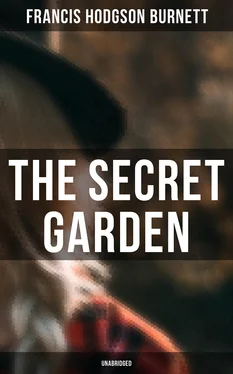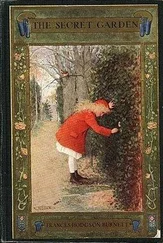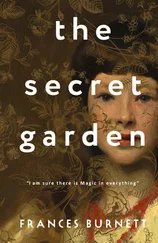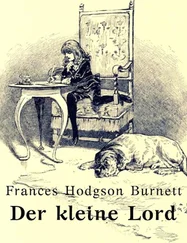Mary’s eyes turned toward her in spite of her intention not to seem to care. She had never thought of the hunchback’s being married and she was a trifle surprised. Mrs. Medlock saw this, and as she was a talkative woman she continued with more interest. This was one way of passing some of the time, at any rate.
“She was a sweet, pretty thing and he’d have walked the world over to get her a blade o’ grass she wanted. Nobody thought she’d marry him, but she did, and people said she married him for his money. But she didn’t — she didn’t,” positively. “When she died —”
Mary gave a little involuntary jump.
“Oh! did she die!” she exclaimed, quite without meaning to. She had just remembered a French fairy story she had once read called “Riquet à la Houppe.” It had been about a poor hunchback and a beautiful princess and it had made her suddenly sorry for Mr. Archibald Craven.
“Yes, she died,” Mrs. Medlock answered. “And it made him queerer than ever. He cares about nobody. He won’t see people. Most of the time he goes away, and when he is at Misselthwaite he shuts himself up in the West Wing and won’t let any one but Pitcher see him. Pitcher’s an old fellow, but he took care of him when he was a child and he knows his ways.”
It sounded like something in a book and it did not make Mary feel cheerful. A house with a hundred rooms, nearly all shut up and with their doors locked — a house on the edge of a moor — whatsoever a moor was — sounded dreary. A man with a crooked back who shut himself up also! She stared out of the window with her lips pinched together, and it seemed quite natural that the rain should have begun to pour down in gray slanting lines and splash and stream down the window-panes. If the pretty wife had been alive she might have made things cheerful by being something like her own mother and by running in and out and going to parties as she had done in frocks “full of lace.” But she was not there any more.
“You needn’t expect to see him, because ten to one you won’t,” said Mrs. Medlock. “And you mustn’t expect that there will be people to talk to you. You’ll have to play about and look after yourself. You’ll be told what rooms you can go into and what rooms you’re to keep out of. There’s gardens enough. But when you’re in the house don’t go wandering and poking about. Mr. Craven won’t have it.”
“I shall not want to go poking about,” said sour little Mary; and just as suddenly as she had begun to be rather sorry for Mr. Archibald Craven she began to cease to be sorry and to think he was unpleasant enough to deserve all that had happened to him.
And she turned her face toward the streaming panes of the window of the railway carriage and gazed out at the gray rain-storm which looked as if it would go on forever and ever. She watched it so long and steadily that the grayness grew heavier and heavier before her eyes and she fell asleep.
Chapter 3
Across the Moor
Table of Contents
She slept a long time, and when she awakened Mrs. Medlock had bought a lunchbasket at one of the stations and they had some chicken and cold beef and bread and butter and some hot tea. The rain seemed to be streaming down more heavily than ever and everybody in the station wore wet and glistening waterproofs. The guard lighted the lamps in the carriage, and Mrs. Medlock cheered up very much over her tea and chicken and beef. She ate a great deal and afterward fell asleep herself, and Mary sat and stared at her and watched her fine bonnet slip on one side until she herself fell asleep once more in the corner of the carriage, lulled by the splashing of the rain against the windows. It was quite dark when she awakened again. The train had stopped at a station and Mrs. Medlock was shaking her.
“You have had a sleep!” she said. “It’s time to open your eyes! We’re at Thwaite Station and we’ve got a long drive before us.”
Mary stood up and tried to keep her eyes open while Mrs. Medlock collected her parcels. The little girl did not offer to help her, because in India native servants always picked up or carried things and it seemed quite proper that other people should wait on one.
The station was a small one and nobody but themselves seemed to be getting out of the train. The station-master spoke to Mrs. Medlock in a rough, good-natured way, pronouncing his words in a queer broad fashion which Mary found out afterward was Yorkshire.
“I see tha’s got back,” he said. “An’ tha’s browt th’ young ’un with thee.”
“Aye, that’s her,” answered Mrs. Medlock, speaking with a Yorkshire accent herself and jerking her head over her shoulder toward Mary. “How’s thy Missus?”
“Well enow. Th’ carriage is waitin’ outside for thee.”
A brougham stood on the road before the little outside platform. Mary saw that it was a smart carriage and that it was a smart footman who helped her in. His long waterproof coat and the waterproof covering of his hat were shining and dripping with rain as everything was, the burly station-master included.
When he shut the door, mounted the box with the coachman, and they drove off, the little girl found herself seated in a comfortably cushioned corner, but she was not inclined to go to sleep again. She sat and looked out of the window, curious to see something of the road over which she was being driven to the queer place Mrs. Medlock had spoken of. She was not at all a timid child and she was not exactly frightened, but she felt that there was no knowing what might happen in a house with a hundred rooms nearly all shut up — a house standing on the edge of a moor.
“What is a moor?” she said suddenly to Mrs. Medlock.
“Look out of the window in about ten minutes and you’ll see,” the woman answered. “We’ve got to drive five miles across Missel Moor before we get to the Manor. You won’t see much because it’s a dark night, but you can see something.”
Mary asked no more questions but waited in the darkness of her corner, keeping her eyes on the window. The carriage lamps cast rays of light a little distance ahead of them and she caught glimpses of the things they passed. After they had left the station they had driven through a tiny village and she had seen whitewashed cottages and the lights of a public house. Then they had passed a church and a vicarage and a little shop-window or so in a cottage with toys and sweets and odd things set out for sale. Then they were on the highroad and she saw hedges and trees. After that there seemed nothing different for a long time — or at least it seemed a long time to her.
At last the horses began to go more slowly, as if they were climbing up-hill, and presently there seemed to be no more hedges and no more trees. She could see nothing, in fact, but a dense darkness on either side. She leaned forward and pressed her face against the window just as the carriage gave a big jolt.
“Eh! We’re on the moor now sure enough,” said Mrs. Medlock.
The carriage lamps shed a yellow light on a rough-looking road which seemed to be cut through bushes and low growing things which ended in the great expanse of dark apparently spread out before and around them. A wind was rising and making a singular, wild, low, rushing sound.
“It’s — it’s not the sea, is it?” said Mary, looking round at her companion.
“No, not it,” answered Mrs. Medlock. “Nor it isn’t fields nor mountains, it’s just miles and miles and miles of wild land that nothing grows on but heather and gorse and broom, and nothing lives on but wild ponies and sheep.”
“I feel as if it might be the sea, if there were water on it,” said Mary. “It sounds like the sea just now.”
“That’s the wind blowing through the bushes,” Mrs. Medlock said. “It’s a wild, dreary enough place to my mind, though there’s plenty that likes it — particularly when the heather’s in bloom.”
Читать дальше












